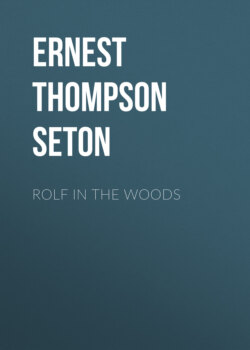Читать книгу Rolf in the Woods - Ernest Thompson Seton - Страница 9
Chapter 5. Good-bye to Uncle Mike
ОглавлениеFor counsel comes with the night, and action comes with the
day; But the gray half light, neither dark nor bright, is a
time to hide away.
Rolf had learned one thing at least—his uncle was a coward. But he also knew that he himself was in the wrong, for he was neglecting his work and he decided to go back at once and face the worst. He made little reply to the storm of scolding that met him. He would have been disappointed if it had not come. He was used to it; it made him feel at home once more. He worked hard and silently.
Mick did not return till late. He had been drawing wood for Horton that day, which was the reason he happened in Quonab's neighbourhood; but his road lay by the tavern, and when he arrived home he was too helpless to do more than mutter.
The next day there was an air of suspended thunder. Rolf overheard his uncle cursing “that ungrateful young scut—not worth his salt.” But nothing further was said or done. His aunt did not strike at him once for two days. The third night Micky disappeared. On the next he returned with another man; they had a crate of fowls, and Rolf was told to keep away from “that there little barn.”
So he did all morning, but he peeped in from the hayloft when a chance came, and saw a beautiful horse. Next day the “little barn” was open and empty as before.
That night this worthy couple had a jollification with some callers, who were strangers to Rolf. As he lay awake, listening to the carouse, he overheard many disjointed allusions that he did not understand, and some that he could guess at: “Night work pays better than day work any time,” etc. Then he heard his own name and a voice, “Let's go up and settle it with him now.” Whatever their plan, it was clear that the drunken crowd, inspired by the old ruffian, were intent on doing him bodily harm. He heard them stumbling and reeling up the steep stairs. He heard, “Here, gimme that whip,” and knew he was in peril, maybe of his life, for they were whiskey-mad. He rose quickly, locked the door, rolled up an old rag carpet, and put it in his bed. Then he gathered his clothes on his arm, opened the window, and lowered himself till his head only was above the sill, and his foot found a resting place. Thus he awaited. The raucous breathing of the revellers was loud on the stairs; then the door was tried; there was some muttering; then the door was burst open and in rushed two, or perhaps three, figures. Rolf could barely see in the gloom, but he knew that his uncle was one of them. The attack they made with whip and stick on that roll of rags in the bed would have broken his bones and left him shapeless, had he been in its place. The men were laughing and took it all as a joke, but Rolf had seen enough; he slipped to the ground and hurried away, realizing perfectly well now that this was “good-bye.”
Which way? How naturally his steps turned northward toward Redding, the only other place he knew. But he had not gone a mile before he stopped. The yapping of a coon dog came to him from the near woods that lay to the westward along Asamuk. He tramped toward it. To find the dog is one thing, to find the owner another; but they drew near at last. Rolf gave the three yelps and Quonab responded.
“I am done with that crowd,” said the boy. “They tried to kill me tonight. Have you got room for me in your wigwam for a couple of days?”
“Ugh, come,” said the Indian.
That night, for the first time, Rolf slept in the outdoor air of a wigwam. He slept late, and knew nothing of the world about him till Quonab called him to breakfast.
